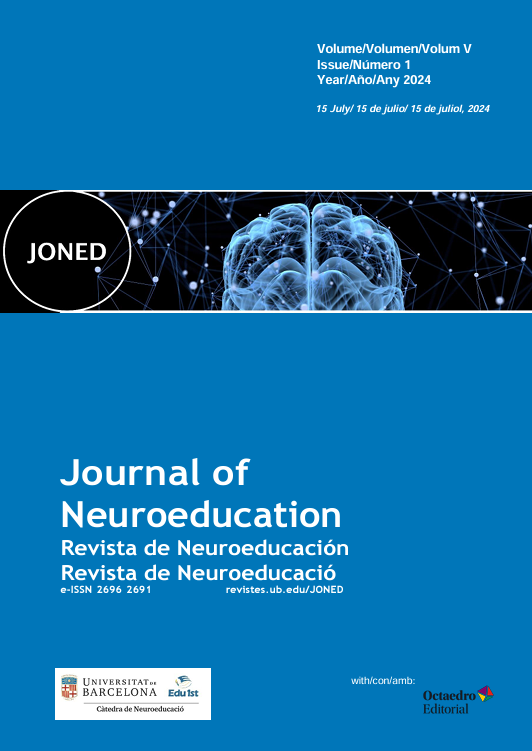Literacy and artificial intelligence
DOI:
https://doi.org/10.1344/joned.v5i1.46108Keywords:
artifical intelligence, new literacies, teaching practiceAbstract
This article proposes to reflect on the evolution of artificial intelligence. It argues that the impact of generative artificial intelligence, such as ChatGPT, constitutes a new milestone in the history of reading and writing. If all technological revolutions produced subjective changes, humanity is invited to conceive what consequences the creation of ChatGPT is having and will have on the process of hominization. Concern about the effect of cognitive delegation to machines is a central theme of the paper. By allowing an AI to perform writing or text analysis tasks, we could be outsourcing critical thinking and reflection, processes that have traditionally contributed to the development of knowledge and deep understanding. However, ChatGPT could also be transformed into a tool capable of exercising thinking in a different and effective way. The text raises important questions about the future of literacy and learning, challenging educational institutions to rethink themselves in the face of this change. It is proposed not only to be attentive to cognitive delegation but also to enable new ways of thinking. For this reason, we promote the deployment of a user-chat interaction that allows not only to evaluate the scope and limits of the tool, but also the user’s reflection on the effectiveness of their prompts.
Downloads
References
Freire, P. La importancia de leer y el proceso de liberación. México. Siglo XXI. 1999.
UNESCO. Estudio Regional Comparativo y Explicativo (ERCE 2019): reporte nacional de resultados; Argentina. https://unesdoc.unesco.org/ark:/48223/pf0000380241
UNICEF. Informe Sectorial Educación. Febrero 2022. El impacto de la pandemia Covid 19 en la educación de niños, niñas y adolescentes. https://www.unicef.org/argentina/media/13346/file/Quinta%20Ronda%20%20Impacto%20de%20la%20pandemia%20en%20la%20educaci%C3%B3n%20de%20ni%C3%B1as,%20ni%C3%B1os%20y%20adolescentes%20.pdf
Olaizola, A. Postear retórica: análisis de caso de dos publicaciones en la comunidad virtual Taringa! Revista Iberoamericana de Argumentación. 2013. N° 6. p. 1-38.
Olaizola, A. Alfabetización Académica en entornos digitales. Cuadernos del Centro de Estudios en Diseño y Comunicación. Ensayos 2017. Nº. 63, p. 203-242.
Piscitelli, A. Nativos digitales. Dieta cognitiva, inteligencia colectiva y arquitecturas de la participación. Cap. 1. Nativos digitales. La insuturable brecha cogniiva y de esos polialfabetismos tan necesitados. Buenos Aires: Santillana. 2009. P 39-52
Carr, N. (2011) Superficiales ¿Qué está haciendo internet con nuestras mentes? Buenos Aires: Aguilar, Altea, Taurus, Alfaguara. 2011.
Pacual-Castroviejo, I. Plasticidad Neuronal. REV NEUROL (Barc) 1996; 24 (135): p. 1361-1366.
Dehaene, S. ¿Cómo aprendemos? Los cuatro pilares con los que la educación puede potenciar los talentos de nuestro cerebro. Cap. 6. Reciclen su cerebro. Buenos Aires. Siglo XXI. 2019. P. 169-197
Maguire, E. Gadian, D. Johnsrude, I. Good, C. Ashburner, J. Frackowiak, R. and Frith, C. Navigation-related structural change in the hippocamp of taxi drivers. Proc. Natl. Acad. Sci. U S A. 2000. April 11. 97 (8) p. 4398–4403.
Dahmani, L., Bohbot, VD. El uso habitual del GPS afecta negativamente la memoria espacial durante la navegación autoguiada. Sci Rep 10 , 6310 (2020). https://doi.org/10.1038/s41598-020-62877-0
Bilinkis, S. y Sigman, M. Artificial. La nueva inteligencia y el contorno de lo humano. Buenos Aires. Debate. 2023.
Manguel, A. Una historia de la lectura. Madrid: Alianza. 1998.
Platón. Fedro, en Obras Completas, tomo 2, Madrid 1871, edición de Patricio Azcárate.
Eysenck, M. Capítulo 6. Memoria semántica y conocimiento almacenado. En Baddeley, A., Eysenck y Anderso, C. Memoria. Madrid: Alianza. 2010. p. 141-164.
Wolf, M. Lector vuelve a casa. Cómo afecta a nuestro cerebro la lectura en pantallas. Barcelona: Planeta. 2020.
Van Dijk, T. y Kintsch, W. Strategies of discourse comprehension. Nueva York: Academic Press. 1983.
Kintsch, W. The role of knowledge in discourse comprehension: a construction integration model. 1988. Psychological Review, 2, p. 163-182.
Kintsch, W. Comprehension. A paradigm for cognition. 1998. Boulder, Colorado, Cambridge University Press.
Parodi, G. (2011) La Teoría de la Comunicabilidad: Notas para una concepción integral de la comprensión de textos escritos. Revista Psignos. 44 (76). P. 145-167.
Bereiter, C., Scardamalia, M. The Psychology of Written Compostion. Hillsdale, N. J. Erlbaum. 1987.
Downloads
Published
Issue
Section
License
Copyright (c) 2024 Alberto Gatti

This work is licensed under a Creative Commons Attribution-NonCommercial 4.0 International License.
The authors who publish in this journal agree to the following terms:
a. Authors retain copyright and grant the journal the right of first publication
b. Texts will be published under a Creative Commons Attribution Non Commercial License that allows others to share the work, provided they include an acknowledgement of the work’s authorship, its initial publication in this journal and the terms of the license, and not for commercial use.



